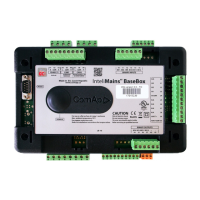InteliMains
NT
, SW version 3.2.0
InteliMains-NT-MCB-MGCB-3.2.0-Reference Guide.pdf, ©ComAp – April 2015
11.2.10.7 Setpoint: Angle Gain
This setpoint is used for adjusting of the gain factor (P-factor) of the phase
angle P-control loop.
The synchronizing process contains two following steps:
1. The first step is to match the bus frequency to the mains frequency.
In this step the frequency regulation loop (Freq reg loop) is active.
2. The following step is to match the phase angle difference of the
mains and bus voltages to the setpoint BtoM AngleReq. The angle
regulation loop is active in this step.
As soon as the phase angle difference stays within the window adjusted by
Phase window and the voltage difference stays in the Voltage window, both
for period Dwell time, the circuit breaker closing command is issued.
NOTE:
See the chapter Regulation loops overview for general information about
regulation loops and their adjustment.
11.2.10.8 Setpoint: Load Ramp
This setpoint adjusts loading/unloading rate. After time defined by this setpoint is
reached NominMainsImp (NominBusLImp in BTB application) is reached.
NOTE:
You can achieve more different load ramps using Force Value function. E.g. for
soft load in parallel with mains use longer ramp than for soft load in island
parallel (multi-stand-by).
CAUTION!
Speed of load ramping to the Mains depends on setting of Load ramp in IM-NT
and also in gen-set controllers.
The Mains import increase/decrease behaves according to following images:

